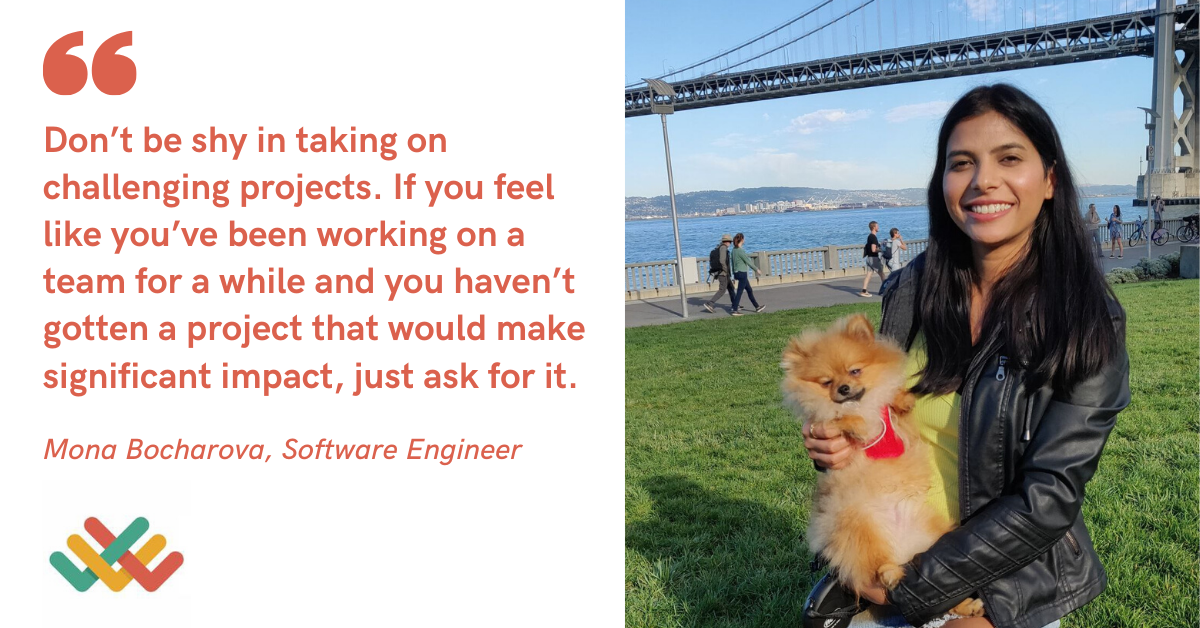Mona Bocharova knows a little something about managing through change.
Over the last eight or so years, she's lived in four countries on three continents and worked in three different roles, going from a freelance writer in India to an account manager in Ukraine and England to a software engineer in the U.S.
Each time, she's gotten used to a new country and a new set of responsibilities. That transition never went so smoothly as it did when just last year she started working as a software engineer at performance management software company Lattice. She joined the San Francisco-based company after pursuing her passion for programming and loving Lattice's thoughtful interview process and diverse interview lineup.
And then everyone went remote as a response to the COVID-19 pandemic, and Mona had to adapt again — it's a good thing she's had some practice.
We sat down with Mona to talk about her successes and failures in managing up and giving/receiving feedback, how to do so even when you don't see your manager in person, and how Lattice's employee-driven culture supports personal and professional growth.
Read on for her advice!
1. If you don't already have a regular (a.k.a weekly) one-on-one with your manager, schedule one.
Just because you're not seeing your manager's face every day and don't have the option to grab them in the hallway to go over some feedback doesn't mean you can't have quality time together.
Set up a dedicated meeting time, says Mona, and don't treat it like any other check-in.
"Having one-on-ones helps you create a connection and can make you feel like, 'Okay, I'm not forgotten, my opinion matters, I matter,'" notes Mona. That's especially important if you're working from home for the first time and are feeling isolated from your team and company.
These meetings should include a regular agenda item of mutual feedback: you to your manager and your manager to you. Lattice's products include performance reviews and a range of manager tools to facilitate productive check-ins, but even if your company doesn't use set tools, make sure that you go through the entire agenda and share takeaways after each meeting so that you have a record of feedback and growth over time.
2. Deliver on your responsibilities and be proactive when you can't.
"Make sure that what you promise, you deliver," says Mona. That's not to say you always have to get it right, though. "There will be projects that you can't deliver on time. Just communicate that proactively," says Mona, who stresses how learning to think from your manager's point of view and raising problems for them ahead of time can deepen their trust in you.
3. Take initiative.
Once you've got your responsibilities handled and you're delivering on your goals, figure out what you can take off of your manager's plate. For example, says Mona, your manager is probably in charge of onboarding new members to the team, but you can take an active role in "getting to know that person and providing any help and support they need" to support your manager (and make a new friend, to boot).
This team-first mentality goes a long way towards creating a positive team culture, explains Mona. "At Lattice, we look at all projects or problems as a team, not as individuals, so nobody feels like they're in it alone," she says.
4. Be explicit in asking for more responsibility.
Identifying areas that you can help out is great, but if you're looking for a step change in your responsibilities that goes beyond a few side projects, ask for it, says Mona.
"Don't be shy in taking on challenging projects. If you feel like you've been working on a team for a while and you haven't gotten a project that would make significant impact, just ask for it straight away. Go and talk to your manager, share your concerns, and don't shy away," she says.
Letting your manager know what you're ready for more gives you control over your growth and shows your manager that they can count on you. "You should not always have the expectations that people will give you something. You have to ask and tell them, 'yes, this is what I want to do,'" says Mona.
5. Don't shy away from sharing your questions and suggestions.
Lattice uses their own products, so Mona has various avenues—including some anonymous ones—to present questions or ideas to management, including weekly pulse surveys, biannual performance reviews and engagement surveys, and regular feedback entries.
But whether or not your company has set ways of raising questions, Mona stresses how important it is that you surface any confusion or suggestions you may have.
"Don't think, 'Oh, I don't want to upset someone,' or 'Maybe I'm the only person in the group who doesn't know this,'" says Mona. If you have an idea on how to improve something, present it with confidence. "Come with facts, information, some case studies about it working at other teams or companies. If you're still getting pushback, you can propose it as an experiment, not an immediate overhaul," says Mona of the best approach for getting your ideas heard.
And if you're confused as to what's happening with a project or strategy, don't stay quiet. Mona shares, "I used to not ask questions because I was worried someone would think I was stupid. But then I realized that in the long term, it's for my own benefit—that's how you grow and develop."
And if you're confused about something, chances are, someone else is too, so don't let fear hold you back from asking your questions in a centralized forum, says Mona. By putting the answer in a team channel or shared location, you're helping other folks, not to mention saving the person with the answer from being pinged half a dozen times!
Summing It Up
When it comes to managing up and soliciting feedback, the strategies don't differ drastically whether you're in or out of the office — they just become infinitely more important when you're working remotely. In the absence of facetime and spontaneous run-ins, scheduled one-on-ones, taking initiative, and regular communication are essential to success.
If you're interested in learning more about Lattice's products and open roles, check out their PowerToFly page. And if you have questions for Mona about managing up while working remotely (or about finding a passion and following it halfway around the world), let her know in the comments!




